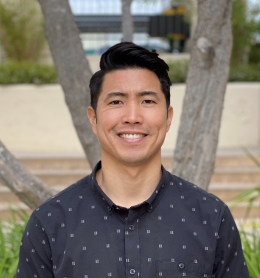
This spring, Ethan Chang, a Chancellor’s Postdoctoral Fellow in Asian American Studies and Black Studies at UCSB presented “An Education for Social Transformation: Learning, Leadership, and the Highlander Idea" via Zoom as part of UCSB Library's Pacific Views: Library Speaker Series.
His lecture examined the people, pedagogy, and practices of the Highlander Research and Education Center and considers how education might foster community leadership and multi-issue struggles for justice.
Our Events & Exhibitions Librarian Alex Regan followed up with Chang to ask how he is thinking about his research in light of the COVID-19 pandemic. Read their exchange below. Note: This interview was conducted prior to the recent Black Lives Matter protests.
Alex: At the beginning of your talk you mention the irony of speaking via Zoom about the importance of human connections in living and learning. You describe the Highlander Research and Education Center as an example of how residential learning environments allow us to engage difference, diminish hierarchies, and blur boundaries. Are you seeing ways in which education can still be a unifying force in a remote learning environment?
Ethan: This is a really important and difficult question. There’s always a danger in talking about education for unity. But as you mentioned, what I think Highlander models is a way of facilitating learning that approaches difference as a powerful basis of solidarity-making. The idea of Highlander has always been about productive conflict. It’s about asking how might we attend to our distinctive social positions, work through those differences, and imagine a more just world in accompaniment with those most marginalized.
That all becomes much more difficult to do online. While I don’t think remote environments can take the place of a summer-long residential experience at an institute like Highlander, activists and movement organizers have offered insights into how we might make the most of online spaces during this pandemic. Matt Harris, a colleague and PhD candidate in Religious Studies here at UCSB, recently directed me toward one such conversation called, “Tied in a Single Garment of Destiny: Black Christian Reflections on Palestine.” The conversation demonstrates how organizers and activists have fused humanizing pedagogies with digital tools. Ash-Lee Woodard Henderson, the Co-Executive Director of the Highlander Research and Education Center, participated in this conversation too, and it was a powerful example of how we might fill virtual spaces with songs, emotions, and back-and-forth dialogue. It also gets at this very question of whether remote learning environments can cultivate unity through difference. This conversation modeled, for me, the possibilities of inter-ethnic and inter-faith learning and movement building.
Alex: Is this current pandemic affecting your work and research focus?
Ethan: Absolutely. And I feel really privileged to have an opportunity to think and respond to a question about work and research right now. But yes, I’m an ethnographer so much of my empirical work relies on sustained, situated observations of social and culture life. That’s certainly not happening right now.
I’ve opted to use the remainder of my postdoc fellowship to think intentionally about pedagogy and design for remote learning. One thing I’ve been trying to do is to study learning at places like Highlander to consider what digital tools do and/or don’t offer. I’m trying to resist an approach to course design that allows the digital to outrun my understandings of effective learning.
To offer one specific example, I’ve been thinking about the value of something as simple as pair-share activities; when students turn to the person next to them and make meaning together. I’m trying to replicate this kind of intimate, one-on-one dialogue in remote learning contexts, which has me exploring other less utilized low-tech solutions like encouraging students to call each other. I’ll have to see what my students think, but my hunch is that talking to someone by phone might afford opportunities for deeper listening and minimize some of the self-awareness that video conferencing tools can sometimes amplify. I’m curious to see what other strategies or practices might emerge from thinking in this way.
Alex: What are you reading, watching and/or listening to right now?
Ethan: Lately I’ve been reading a lot about time. Crises have a way of focusing our attention on the immediate and rightfully so. But social movement leaders and activist-scholars have always had inventive ways of bringing the immediate into conversation with the long term. I just read M. Jacqui Alexander’s Pedagogies of Crossing and she writes that we need to voice demands for bread and dignity in the same breath. What a poetic phrasing for thinking about the current moment. We might use Alexander’s insights to link demands for immediate, material needs--for bread, housing, healthcare, and so on--with the slow, long term educational and organizing work required to build a more dignified, less inhumane world.
Some other texts I’ve been reading along this theme of time include: Heartbeat of Struggle by Diane Fujino, Our History is the Future by Nick Estes, and A Life in the Struggle by George Lipsitz. I’m trying to figure out how to make my life useful and how to be accountable to the crisis moment in ways that are also sustainable. These readings also tie in with a really fascinating PBS series on Asian Americans we just finished watching. UCSB librarian Gary Colmenar has been spreading the word about it and it’s fantastic. It’s been incredible to see Asian women who look like my mother and sisters doing the work of building a more just world.
Watch Ethan's talk:


